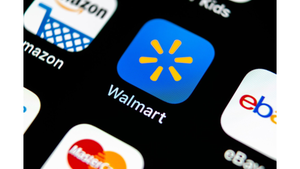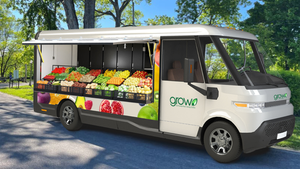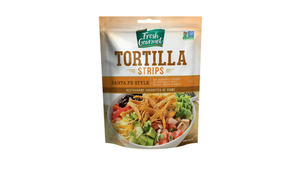PLACING THE CALL
Shrinkage concerns are leading retailers to take extra precaution in choosing phone card merchandising programs.Many are offering the credit-card-size product, which some food chains reportedly have sold in denominations up to $50, from behind the service counter. But others are exploring new approaches, such as selling them directly out of the till or in vending machines."We prefer vending machines
April 15, 1996
CAROL ANGRISANI
Shrinkage concerns are leading retailers to take extra precaution in choosing phone card merchandising programs.
Many are offering the credit-card-size product, which some food chains reportedly have sold in denominations up to $50, from behind the service counter. But others are exploring new approaches, such as selling them directly out of the till or in vending machines.
"We prefer vending machines because they
don't require as much labor. They're a totally turnkey operation," said L. Andrew DePaolis, corporate vice president of advertising and sales promotion at Grand Union Co., Wayne, N.J.
Other strategies are even more innovative, such as J-hooking empty packages, then providing an active card once a sale is made, or even issuing a "cardless" product through the use of electronic checkout coupons.
Retailers are grappling with these types of merchandising options due to the fast growth of the industry. Phone cards have been widely used in Europe, where they originated, and they've grown tremendously in the United States in the last year.
Though a mere five companies sold the product in the United States six years ago, today at least 500 companies are on the market. Sales in the United States could reach $2 billion by the end of 1996, increasing exponentially over the next few years, according to industry observers.
Phone cards, also called telecards and debit cards, carry about 10% to 30% margins, according to retailers. But many supermarkets find them attractive because they are an added customer convenience.
This is why the type of merchandising program chosen is so important, observers say. Retailers want them to be readily accessible but, due to their higher price point, completely secure.
Grand Union is selling a private-label card from vending machines at its 134 Northern region stores, according to DePaolis. Due to space limitations, they are sold out of the register at Grand Union's other stores.
Like Grand Union, other chains feel vending machines are the most efficient option. Bashas' Markets, Chandler, Ariz., which sells Talk 'N Toss cards, is in the process of rolling out phone card vending machines to several of its stores, according to Jeff Penchina, vice president of sales and marketing for the retail division at Talk 'N Toss, Vancouver, Wash. Bashas' officials were unavailable for comment.
The cards are sold in four different denominations -- $5, $10, $15 and $20. "The machines are located near an ATM or a lottery machine -- somewhere that has high visibility," Penchina said.
Penchina said sales are higher in stores that sell them from vending machines, which are about 5 feet high and 3 feet wide.
Other retailers also are thinking about using vending machines. Minyard Food Stores, Coppell, Texas, for instance, may use them in select stores within the next year.
"We may choose vending machines because it reduces labor," said Mario LaForte, vice president of finance and treasurer.
For now, however, Minyard sells them strictly at the courtesy counter. "We sell them at the courtesy counter because it's centrally located," LaForte said.
Vending machines may be appropriate for some chains, but they're not right for all. Due to space constraints, many prefer to offer them at the service counter or out of the cash register. But these options, especially the latter, are often too labor-intensive, retailers said.
"We don't want cashiers to have to ask customers if they want to buy a phone card," LaForte of Minyard said.
One way to increase exposure, but keep labor and shrink in check, is to offer the product at the checkout, though not directly out of the till. To help in this effort, Talk 'N Toss is creating plastic trays that can be pegged on racks at registers. It previously offered only clip strips.
Keeping them near the checkout can help reduce shrink, said retailers. What makes phone cards susceptible to theft is their growing price points. Though $5 to $20 cards are the most popular, more expensive stockkeeping units are emerging. The reason is that as consumers become more accustomed to making cashless calls, they're also becoming interested in longer amounts of phone time.
Albertson's, Boise, Idaho, is testing a 180-minute Talk 'N Toss card that sells at a suggested retail of $46.99, according to Penchina. The retailer also sells 30- and 90-minute cards, with the latter selling for $25. Albertson's officials were unavailable for comment.
"Consumers normally start off with a 15- or 30-minute card as a trial. Once they start getting used to it, they want to purchase more," Penchina said.
Weis Markets, Sunbury, Pa., offers a branded card at its courtesy counter, but also is dispensing a "cardless" phone card.
Under the program, an electronic phone card delivery system created by Catalina Marketing, St. Petersburg, Fla., certain prepromoted products are tagged with a phone card certificate. Consumers who purchase a designated amount of tagged items get a phone card coupon when they check out. Just like a regular phone card, the coupon has an 800 number and a personal identification number printed on it. Most are good for five to 10 minutes of phone time.
Norm Rich, president of Weis, said the system is beneficial to the chain because it is supported by Catalina.
"We like the coupons because there are promotional monies available," said Rich.
The Catalina program, called Checkout Callfree, was implemented last fall. Integrated with Catalina's scanning system, it already has issued more than 10 million minutes of phone time, said George Mercer, Catalina's vice president of marketing and new products.
Phone card coupons are more cost-efficient than standard cards because they don't have to be laminated and packaged, Mercer said.
"Our program cuts out the costly element associated with most phone card programs," Mercer said. "It's a consumer-friendly program that offers instant rewards."
To date, Catalina has conducted 17 phone card programs with manufacturers, according to Mercer. Most of the items featured in the program are in personal care and household categories, he added.
While programs like these are attractive, chains also opt for traditional display programs, such as at the service or courtesy counter.
Supervalu's Great Lakes division, Pleasant Prairie, Wis., sells its Preferred Selection private-label card from behind the service counter, according to Lynn Burnett, general merchandise merchandiser.
"Since [phone cards] are active, we have to keep them secure," Burnett said.
The cards, launched in February, already have been introduced in 30% of Supervalu's stores, and are planned to be in 75% by the end of the year. They are sold in $10 and $20 denominations, and promoted in window banners, buttons, fliers and circular ads.
Burnett said they're generating strong sales.
"They continue to do well every day," Burnett said.
Like Supervalu, Family Fare, Hudsonville, Mich., feels it will get higher sales by selling its forthcoming private-label card at the service counter, said Jeff Kunnen, director of nonfood. It eventually may expand the program to the cash register.
"We felt we would have higher turns if they were sold at the service counter or till," Kunnen said.
Family Fare plans to roll out the private-label phone card to all of its stores by May 1. The cards will feature the Family Fare logo as well as a picture of fresh fruit and vegetables, both of which Kunnen said the chain is focusing on this year.
"It's a nice looking card with bright oranges, apples and other fruit," he said.
Family Fare's card will be offered in $10 and $25 denominations. Promotions will include in-store signs and point-of-sale material.
About the Author
You May Also Like






